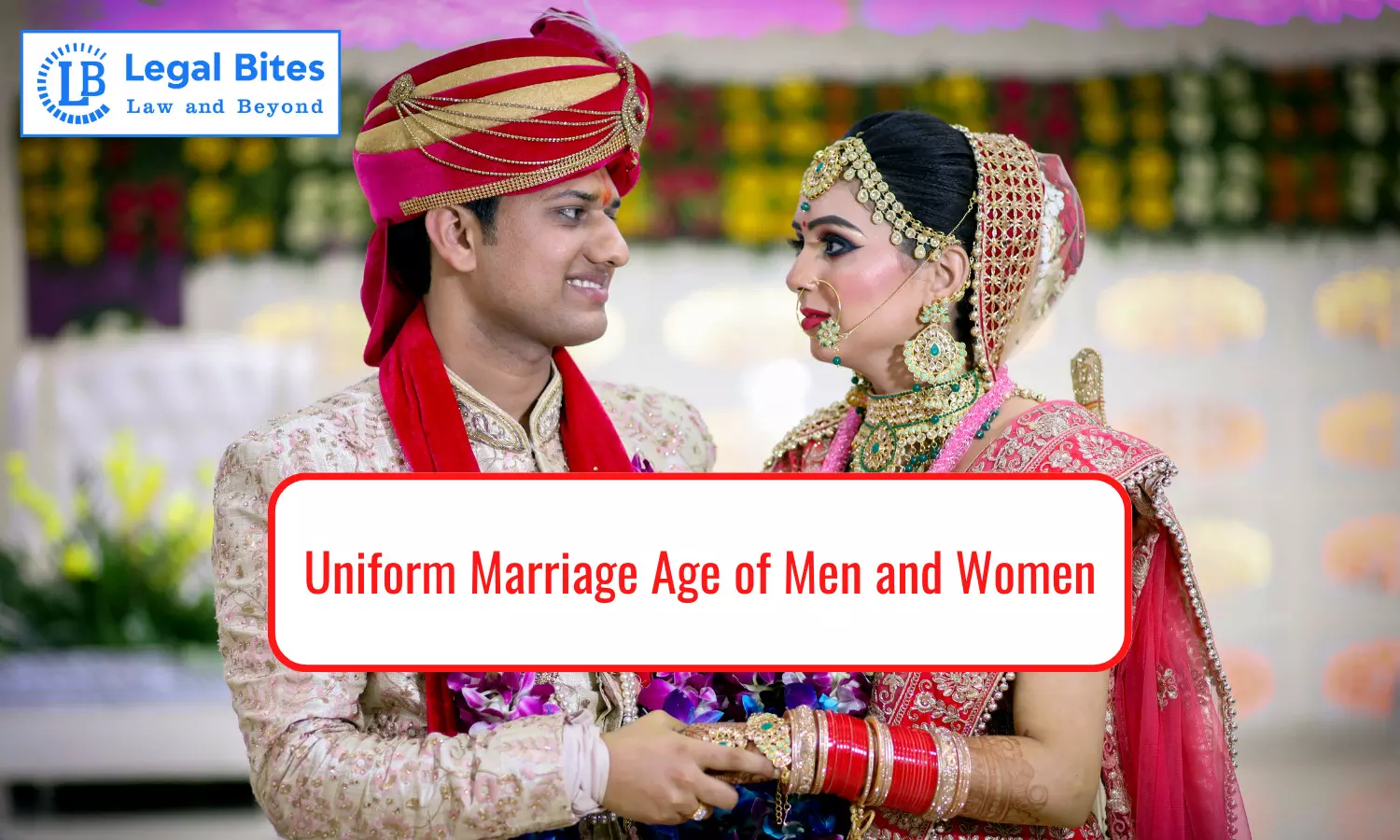Uniform Marriage Age of Men and Women
The article 'Uniform Marriage Age of Men and Women' is an attempt to emphasise the issue of the legal age of marriage as marriage is a big decision so an increase in the age of girls would help them to take the right decision.

The article 'Uniform Marriage Age of Men and Women' is an attempt to emphasise the issue of the legal age of marriage as marriage is a big decision so an increase in the age of girls would help them to take the right decision.
Introduction
In India, the legal age for marriage for men and women is 21 and 18 years, respectively. This is determined by the Indian Majority Act, of 1875, which sets the age of majority at 18 years. However, in certain circumstances, individuals may be permitted to marry before reaching the minimum age requirement.
Historical background
Historically, the legal age for marriage in India has varied depending on the community or religion of the individuals involved. For example, Muslim personal law in India allows for men to marry at the age of 18, while women can marry at the age of 16 with the consent of their guardians. Hindu personal law, on the other hand, sets the age of marriage for men at 21 and women at 18.
In 1978, the Child Marriage Restraint Act was passed, which raised the age of marriage for girls to 18 and boys to 21. However, the act allowed for exceptions to be made in certain circumstances, such as with the consent of the parents or guardians.
Recent Developments
In recent years, there have been calls to raise the legal age for marriage for both men and women to 21. The reason for this is that the age of 18 is considered to be too young for individuals to make such a significant decision and raising the age of marriage to 21 would help to prevent child marriages and protect the rights of children.
Additionally, there have been efforts to address the issue of child marriages in India through the implementation of stricter penalties for those who arrange or participate in such marriages. In 2017, the Indian government introduced the Prohibition of Child Marriage (Amendment) Bill, which proposed to increase the punishment for those who arrange or conduct child marriages from three months to two years.
However, the bill faced opposition from some quarters, as they argued that it would lead to increased harassment of rural families and interference in the personal laws of various communities.
The Prohibition of Child Marriage Act, 2006
The PCMA passed in 2006, was a significant step towards ending the practice of child marriage in India. The Act defines a child as any person below the age of 18 years and prohibits the solemnization of any marriage where either of the parties is a child. The Act also criminalizes the practice of child marriage and provides for punishment for anyone who performs, conducts or abets such a marriage.
The Act also provides for the annulment of any child marriage that has already taken place. This can be done by either party to the marriage, or by any person who knows the marriage, by filing a petition in the court. Once a petition for annulment is filed, the court is required to hear the matter and pass an order within 60 days.
Argument for Raising the age of Marriage
Raising the legal age of marriage for both men and women to 21 would help to protect the rights of children and prevent child marriages. It would also ensure that individuals can make informed decisions about marriage, as they would have more time to complete their education and gain financial independence before getting married.
Argument against raising the age of marriage
Opponents of raising the legal age of marriage argue that it would interfere with the personal laws of various communities and could lead to increased harassment of rural families. They also argue that individuals should have the right to make their own decisions about marriage, regardless of their age.
Case laws
Independent Thought v. Union of India (2017)
The Supreme Court upheld the validity of the Prohibition of Child Marriage Act, 2006, which sets the minimum age of marriage for women at 18 years and for men at 21 years. The court held that any provision in personal laws, which permits marriage below the age of 18 years for girls, is void and violative of the fundamental rights guaranteed under the Constitution of India.
Mrs Tahra Begum v. State of Delhi (2012)
The Delhi High Court has ruled that under the Muslim Personal Law, Muslim girls can marry without their parent’s permission once they reach puberty. Such marriages are not intended to be annulled, but a girl has the option of considering her marriage to be annulled when she reaches the age of majority i.e., 18 years.
Seema Begaum v. State of Karnataka (2013)
The Karnataka High Court disagreed with the Delhi High Court’s position in the Tahra Begum case, stating that the Prohibition of Child Marriage Act, 2006 applies to all Indian citizens regardless of religion.
Conclusion
In conclusion, while there have been calls to raise the legal age of marriage for both men and women to 21 in India, the issue is complex and multifaceted. It is important to consider the rights and well-being of children, as well as the cultural and religious traditions of various communities in India. While raising the legal age of marriage may help to prevent child marriages, it is important to ensure that any changes made do not negatively impact the rights and autonomy of individuals.
References
[1] [2017] 10 SCC 800
[2] W.P. (Crl) 446/2012
[3] Writ Petition (Civil) No. 382/2013
Important Links
Law Library: Notes and Study Material for LLB, LLM, Judiciary, and Entrance Exams

